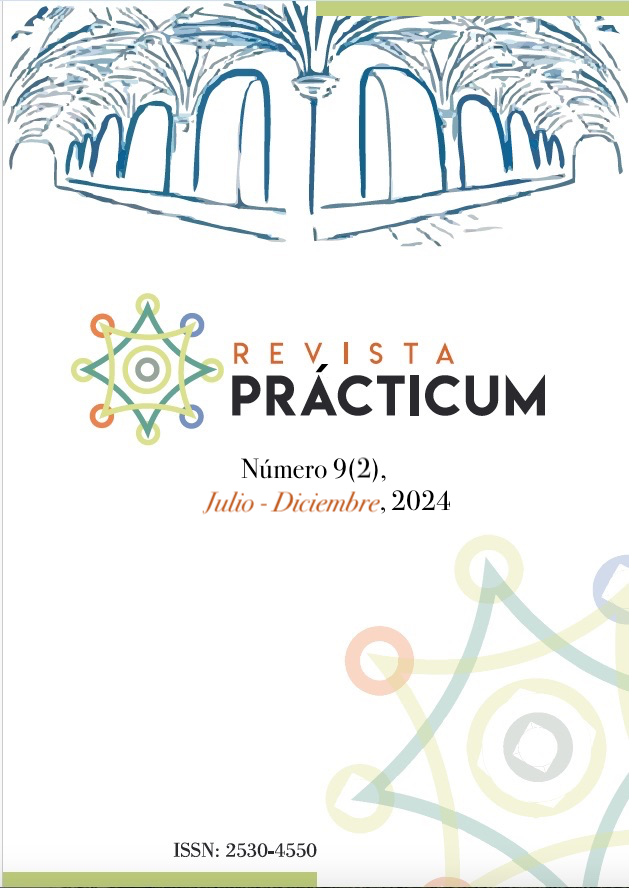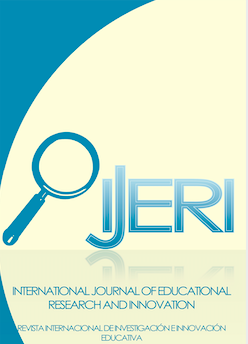Un estudio cualitativo sobre las relaciones de cooperación y colaboración de los estudiantes durante el periodo de prácticas
DOI:
https://doi.org/10.24310/rep.9.2.2024.20905Palabras clave:
colaboración, cooperación, formación del profesorado, desarrollo profesional, prácticasResumen
La colaboración del profesorado es un factor clave para mejorar la calidad de la escuela, su profesionalidad e incluso su salud. Sin embargo, estos aspectos no se tienen en cuenta lo suficiente. Una forma de mejorar esta situación es poner en práctica comportamientos cooperativos desde el principio, desde la formación universitaria del profesorado. Este estudio muestra cómo, con quién y por qué colaboran los estudiantes en la universidad durante su semestre de prácticas, considerando un proyecto realizado en una universidad alemana, para un programa del Máster en Educación. El método utilizado fueron entrevistas cualitativas en las que los estudiantes también señalaron los beneficios y desventajas de la colaboración docente y si estaban satisfechos con las dimensiones que experimentaban. Los resultados muestran que a pesar que existe una predisposición a la colaboración, hay muchos aspectos que mejorar para hacerla realmente efectiva.
Descargas
Métricas
Publicación Facts
Perfil de revisores N/D
Información adicional autores
Indexado: {$indexList}
-
Indexado en
- Sociedad Académica/Grupo
- N/D
- Editora:
- Universidad de Málaga
Citas
Aliaga Cruz, R., Ávila Arias, R. N., Acevedo Lemus, V. G., & Céspedes Chauca, M. de J. (2022). Trabajo colaborativo: Un reto en la formación docente. Educación, 28(1), e2533. https://doi.org/10.33539/educacion.2022.v28n1.2533
Arnaiz Sánchez, P., Escarbajal Frutos, A., Alcaraz García, S., & Haro Rodríguez, R. D. (2021). Formación del profesorado para la construcción de aulas abiertas a la inclusión. Revista de educación, 393, 37-63.
Bauer, K.-O. (2008). Lehrerinteraktion und -kooperation. En W. Helsper & J. Böhme (Hrsg.), Handbuch der Schulforschung, 839-856. Wiesbaden: VS.
Böhm-Kasper, O., Bos, W., Körner, S. C. & Weishaupt, H. (2001). Belastung und Beanspruchung von Lehrern und Schülern am Gymnasium. Max-Traeger-Stiftung.
Bondorf, N. (2013). Profession und Kooperation. Eine Verhältnisbestimmung am Beispiel der Lehrerkooperation. Wiesbaden: Springer VS.
Bush, A., & Grotjohann, N. (2020). Collaboration in teacher education: A cross-sectional study on future teachers’ attitudes towards collaboration, their intentions to collaborate and their performance of collaboration. Teaching and Teacher Education, 88, 102968. https://doi.org/10.1016/j.tate.2019.102968
Carrete-Marín, N., Boix Tomàs, R., & Buscà Donet, F. (2024). Analysis of the Contribution of Rural Schools to the Territorial Dimension from the Teachers’ Perspective. Revista de Investigación Educativa, 42(2), 311-329. https://doi.org/10.6018/rie.559011
Drossel, K., Eickelmann, B., van Ophuysen, S., & Bos, W. (2019). Why teachers cooperate: An expectancy-value model of teacher cooperation. European Journal of Psychology of Education, 34, 187-208.
Gräsel, C., Fußangel, K. & Pröbstel, C. (2006). Lehrkräfte zur Kooperation anregen. Eine Aufgabe für Sisyphos? Zeitschrift für Pädagogik, 52(2), 205-219.
Gräsel, C. & Gruber, H. (2000). Kooperatives Lernen in der Schule. Theoretische Ansätze - Empirische Befunde - Desiderate für die Lehramtsausbildung. En N. Seibert (Hrsg.), Unterrichtsmethoden kontrovers. Bad Heilbrunn: Klinkhardt.
Imbernon, F. (2024). Tendencias y retos internacionales en la formación permanente del profesorado para la innovación educativa. RECIE. Revista Caribeña De Investigación Educativa, 8(1), 215–229. https://doi.org/10.32541/recie.2024.v8i1.pp215-229
Krečič, M. J., & Grmek, M. I. (2008). Cooperative learning and team culture in schools: Conditions for teachers’ professional development. Teaching and teacher Education, 24(1), 59-68.
Kuper, H. & Kapelle, N. (2012). Lehrerkooperation aus organisationssoziologischer Sicht. En E. Baum, T.-S. Idel & H. Ullrich (Hrsg.), Kollegialität und Kooperation in der Schule. Theoretische Konzepte und empirische Befunde (SpringerLink Bücher, S. 41-51). Wiesbaden: Springer.
Moriche, M. P. R., González, M. V., Pareja, D. G., & Gómez, J. P. (2022). Mejora de los programas de formación inicial docente a partir de la trayectoria personal, académica y profesional del alumnado. Revista Electrónica Interuniversitaria de Formación del Profesorado, 25(2), 1-14. https://doi.org/10.6018/reifop.512851
Nittel, D. (2004). Die 'Veralltäglichung' pädagogischen Wissens. Im Horizont von Profession, Professionalisierung und Professionalität. Zeitschrift für Pädagogik, 40, 342-357.
OCDE (Hrsg.). (2005). Teachers matters. Attracting, Developing and Retaining Effective Teachers.
Peters, R. (2004). Erwachsenenbildungs-Professionalität. Ansprüche und Realitäten. Theorie und Praxis der Erwachsenenbildung. Available online under http://www.die-bonn.de/doks/peters0401.pdf
Pröbstel, C. & Soltau, A. (2012). Wieso Lehrkräfte (nicht) kooperieren - Die Bedeutung "personaler Faktoren" in der Zusammenarbeit am Arbeitsplatz Schule. En E. Baum, T.-S. Idel & H. Ullrich (Hrsg.), Kollegialität und Kooperation in der Schule. Theoretische Konzepte und empirische Befunde, 55-76. Wiesbaden: VS.
Reh, S. (2008). "Reflexivität der Organisation und Bekenntnis. Perspektiven der Lehrerkooperation. In: W. Helsper & R. Tippelt (Hrsg.), Pädagogische Professionalität in Organisationen. Neue Verhältnisbestimmungen am Beispiel der Schule (163-183). Wiesbaden: VS.
Richter, D. & Pant, H. A. (2016). Lehrerkooperation in Deutschland. Eine Studie zu kooperativen Arbeitsbeziehungen bei Lehrkräften der Sekundarstufe I. Gütersloh: Bertelsmann Stiftung.
Rothland, M. (2012). Lehrerbildung und Lehrerkooperation. Programmatik, Ausbildungsrealität und Befunde zu den Voraussetzungen von Lehramtsstudierenden für die kollegiale Zusammenarbeit im Beruf. En E. Baum, T.-S. Idel & H. Ullrich (Hrsg.), Kollegialität und
Kooperation in der Schule. Theoretische Konzepte und empirische Befunde, 191-204. Wiesbaden: VS.
Schaarschmidt, U. (2005). Gesundheit im Lehrerberuf - Analyse eines veränderungsbedürftigen Zustandes. Weinheim: Beltz Verlag.
Schicke, H. (2011). Organisationsgebundene pädagogische Professionalität. Initiierter Wandel - theoretisches Konstrukt - narrative Methodologie - Interpretation (Erziehungswissenschaften). Zugl: Berlín, Humboldt-Univ., Diss., 2010. Opladen u.a.: Budrich UniPress.
Schüssler, R., Schwier, V., Klewin, G., Schicht, S. Schöning, A. & Weyland, U. (Hrsg.). (2014). Das Praxissemester im Lehramtsstudium. Forschen, Unterrichten, Reflektieren. Bad Heilbrunn: Klinkhardt.
Spieß, E. (2004). Kooperation und Konflikt. En Organisationspsychologie - Gruppe und Organisation, 193-250. Göttingen: Hogrefe.
Steinert, B., Klieme, E., Maag Merki, K., Döbrich, P., Halbheer, U. & Kunz, A. (2006). Lehrerkooperation in der Schule: Konzeption, Erfassung, Ergebnisse. Zeitschrift für Pädagogik, 52, 185-204.
Terhart, E. (2002). Standards für die Lehrerbildung. Eine Expertise für die Kultusministerkonferenz. Münster: University of Münster.
Terhart, E. & Klieme, E. (2006). Kooperation im Lehrerberuf. Forschungsproblem und Gestaltungsaufgabe. Zeitschrift für Pädagogik, 52, 163-166.
Werner, S. (2012). Wie kommt Kooperation in die Schule? Zum Spannungsverhältnis zwischen Interventionsidee und schulpraktischer Umsetzung. En E. Baum, T.-S. Idel & H. Ullrich (Hrsg.), Kollegialität und Kooperation in der Schule. Theoretische Konzepte und empirische Befunde, 135-148. Wiesbaden.

Publicado
Cómo citar
Número
Sección
Licencia
Derechos de autor 2024 Annika Bush, Núria Carrete-Marín (Autor/a)

Esta obra está bajo una licencia internacional Creative Commons Atribución-NoComercial-CompartirIgual 4.0.
La aceptación de la obra conlleva por parte del autor/a ceder a la Revista Prácticum en exclusiva los derechos de reproducción, distribución y venta de su obra en todo el mundo, tanto en formato digital como de papel, CD-rom, etc.
Igualmente los autores/as cederán a la Revista Prácticum los derechos de difusión, comunicación pública en internet y redes informáticas, buses de datos, como cualquier otro portal o dispositivo electrónico para consultas online de sus contenidos y extractos, y bajo las condiciones del portal, repositorios o la base de datos donde se halle la obra.
La Revista Prácticum anima a los autores la publicación y difusión de sus artículos y obras en sus páginas web personales, equipos de investigación, los repositorios institucionales y bases de datos científicas.
Todos los contenidos publicados en Revista Practicum están sujetos a la licencia Creative Commons Reconocimento-NoComercia-Compartirigual 4.0 cuyo texto completo puede consultar en <http://creativecommons.org/licenses/by-nc-sa/4.0>










8.png)








